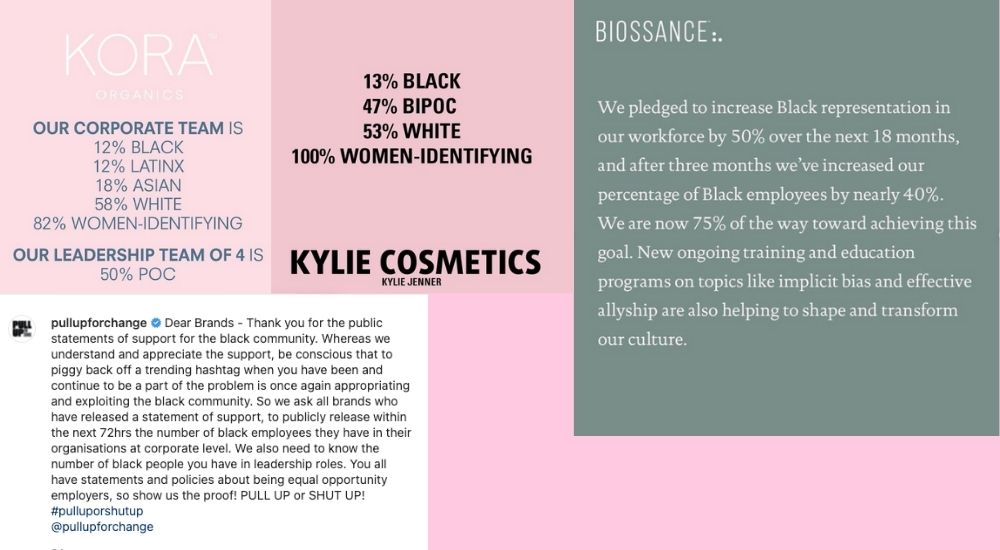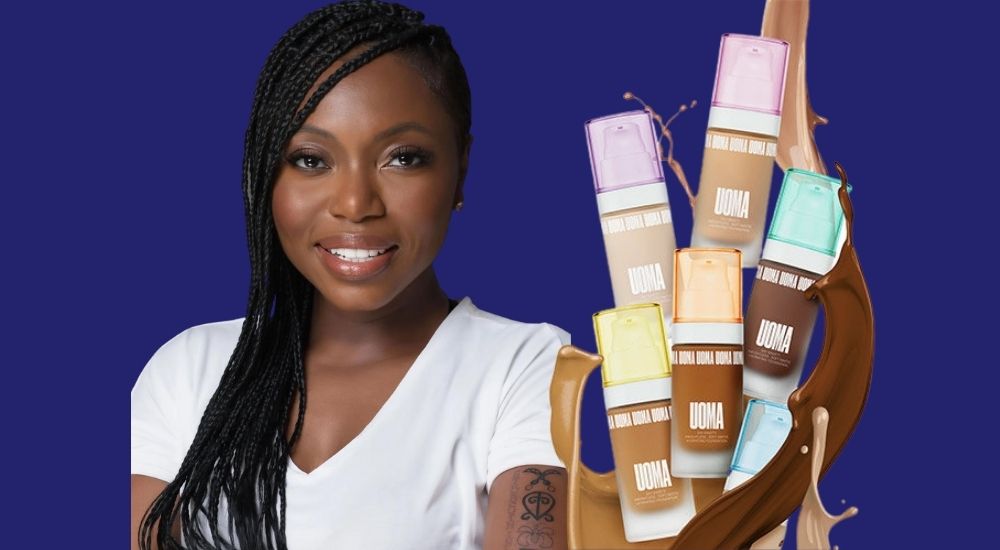UOMA Beauty is a brand with a mission. UOMA’s founder Sharon Chuter is a Nigerian-born ex-beauty executive. She got her start in the industry early – at just nineteen, Sharon negotiated the launch of Revlon in Nigeria, becoming a distributer before she turned 20. She then moved to Australia, where she was working as an executive for some of the biggest global brands in beauty. Sick of being the only person of colour in boardroom meetings and working on ranges that catered to white-skin only, Sharon started UOMA Beauty in 2018. The cosmetics line is less a brand and more a movement – an ethos made evident by their first-ever advertising campaign. The one minute campaign opens with the voice of civil rights activist Malcolm X and a fragment of his rallying cry: “Who taught you to hate yourself, from the top of your head to the soles of your feet?” As women of all complexions dance to afrobeat wearing colourful makeup, Chuter’s declares, “beauty is our birthright.”
While Sharon’s former colleagues might find this “marketing” strategy risky, promoting socioeconomic and racial diversity was critical for Chuter, who launched the brand in the second year of the Trump presidency. Appearing on the Drew Barrymore show in 2020, she said of her mission: “For me, it would be odd going about selling lipsticks and eyeliners when people are dying and starving… there was no other option.” During Black Lives Matter she kicked off the #pulluporshutup campaign – demanding brands posting in support of the movement demonstrate how many non-white employees they were employing in executive roles.
In 2021 named by WWD in their 50 Most Powerful Women, creating change across industries. We spoke to Shannon about entering the beauty industry at 19, championing change and why the industry needs a version of “diversity” beyond advertising campaigns and shade ranges.
Previous to UOMA what was your professional background in the beauty industry?
My first experience with beauty was with my mom and her red nail polish. My mom didn’t allow me to explore makeup as a concept until really late in life. At the time, I hated it! But it was good for me. I got to explore my inner before I learned how to express it with colour. But by the time I was a teenager, I was teenager exploring makeup I realised none of the major beauty brands were sold in Nigeria. I was determined to change that. I was responsible for bringing Revlon to Nigeria when I was 19 years old. I later moved to Australia and began working my way up through some of the biggest names in beauty – from L’Oreal to LVMH.

How did your experiences working at an executive level in the beauty industry inform UOMA beauty?
I was constantly frustrated by beauty companies’ inability to create products that cater to diverse customers. I would be in meetings about complexion products, sometimes the only person of colour in the room, and would call out that my skin colour wasn’t represented in the product offering (and various other skin tones, for that matter). The executives would dismiss the comment. As a woman of colour, I understand the impact lack of representation has on women. I created UOMA to introduce a makeup range that is forward-thinking, radical and uncompromising. UOMA is a global movement. UOMA is a tribe where everyone is welcome. It’s a brand through which I can challenge the system with products that are groundbreaking in innovation and exceptional in quality and created for every person from their inception.
Can you tell us about the #PullUporShutUp campaign you ran in 2020?
I launched the #PullUporShutUp campaign to spotlight the underrepresentation of black people in corporate America – despite public statements from brands reacting to the anti-racism revolution surrounding the murder of George Floyd. The campaign was a social call-to-action for brands to release the number of black employees they have in corporate leadership roles [Shannon commented on the Drew Barrymore show that while representation was necessary, black people in the boardroom and economic opportunities for black people in the beauty industry are more important: “It’s like a computer – whatever you put in is what’s going to come out.”]
“Over 350 brands have pulled up from June 2020 to date, including brands such as Sephora, Revlon, Coty, and Milani.”
UOMA is known for having one of the best shade ranges in the market, with a specific focus on a full spectrum of undertones. What was the process of creating 40 shades that varied in an undertone as well as depth?
“Humans! One thing that distinguishes UOMA beauty from most of the market is we test on actual humans. You see how big of a deal Covergirl made when they finally trialled on people! They did a whole advertising campaign around it. We don’t need to do an advertising campaign to say we tested our foundation on 350 skin types from different backgrounds. When you test on real skin, everything falls into place. You’re adjusting tone based on real skin. Other brands go buy a product off the shelf, send it to a lap and shade match what is already on the market. Some are even sending Pantones! Literally Pantones. Many complexion products on the market have not been trialled on a person before they go to market. That’s our secret source.”
With regards to representation, how important is it that makeup artists can shade match and cater to a range of skin tones?
It’s critical. I’ve never understood that we have the title “Makeup Artist” in our industry and then someone you call a “POC Makeup Artist.” It creates an actual deterrent for makeup artists who want to learn how to do skin of colour, because once you do, you get pigeonholed into “You’re a makeup artist for skin of colour.” Or even worse, if you’re a makeup artist of colour, the assumption is that you only do skin of colour. So then makeup artists who can’t cater to skin of colour are rewarded under the current system. And a makeup artist who can do all skin tones is moved into a niche space – which is crazy. It must become the norm and the standard, and if you can’t do all skin you should forget about it. The same goes for hair! You don’t have to be “specialty” to know how to braid. You should know from your education how to style textured hair.
Your website includes educational content around colour matching for your skin tone and shade – this aids the buyer journey in a D2C environment, but do you also feel it’s empowering to consumers to have the ability to shade match themselves?
“A lot of people don’t know about their skin. UOMA is about a lifestyle of s self-love and authenticity, and the journey of self-love starts with knowing yourself. I’ve found a lot of the things we hate about ourselves. When we understand ourselves, we can turn those things into strengths. I don’t want to be the expert and the guru. I want to help my customers understand themselves and make independent choices. I want you to be the expert on your skin! I want you to understand, “well, that or this is my phototype.” Suppose I am a HONEY, HONEY! What does that mean? Is my skin oily? Or is it combination? How do I react to the sun? Why is the skincare ingredient in there?”
“Regarding ingredients, we want to explain to people why certain ingredients are included as opposed to running scare campaigns like “TOXIC FOR YOU” (when there’s no explanation as to why it is toxic). Information is power, so that’s what we lean into.”
What kind of progress have you seen over the last five years, and what do you hope to see in the future?
“We’ve seen some progress. The standard has risen because consumers are more aware, and that’s nice. Consumers are the ones who can bring about change. But inclusivity isn’t defined by shade range. Right now if you have 50 shades, you’re labelled inclusive. No. Inclusivity has to be all the way around your ecosystem. Who are you employing? Because that affects what you put out into the market. Who is working behind the scenes? What creators are you working with? Inclusivity is 360.”
“You will see a brand with a shade range of 50 or 60, but they don’t have a mascara woman of colour can use. I am the only brand in the world operating in prestige and mass [Chuter launched UOMA in American mass retailer ULTA last year]. Because I understand that inclusivity is not just about skin colour, it’s about including people in different social and economic backgrounds. So I find it laughable seeing companies saying they are leading the charge of inclusivity when their product are only sold at $40-50. What about people who can’t afford that? They are then not included in your world.”
“The industry needs to move past inclusivity just being about shades and complexion. For me, “inclusivity” is not a buzzword. It’s a lifestyle. Even at a detriment to my brand image. How can you ask someone to buy something at high and low prices? But that’s the world we need to live in. Where luxury is not determined by scarcity, you can have accessibility without detriment to your “brand”. I believe luxury is now determined by taste and value. That’s what luxury is about. So when I say all are welcome in my tribe, ALL are welcome. And I hope, and I wish other brands would follow, but we have a long way to go to get there.”
Want more about diversity in the beauty industry? Read our Mind the Gap report.
Read the current issue of our digital magazine here:
- For more news and updates, subscribe to our weekly newsletter
- Follow us on Instagram
- Like us on Facebook
- Join Australia’s largest network of beauty industry professionals on LinkedIn
- Subscribe to our print magazine
Have an idea for a story or want to see a topic covered on our site and in our pages? Get in touch at info@professionalbeauty.com.au.

